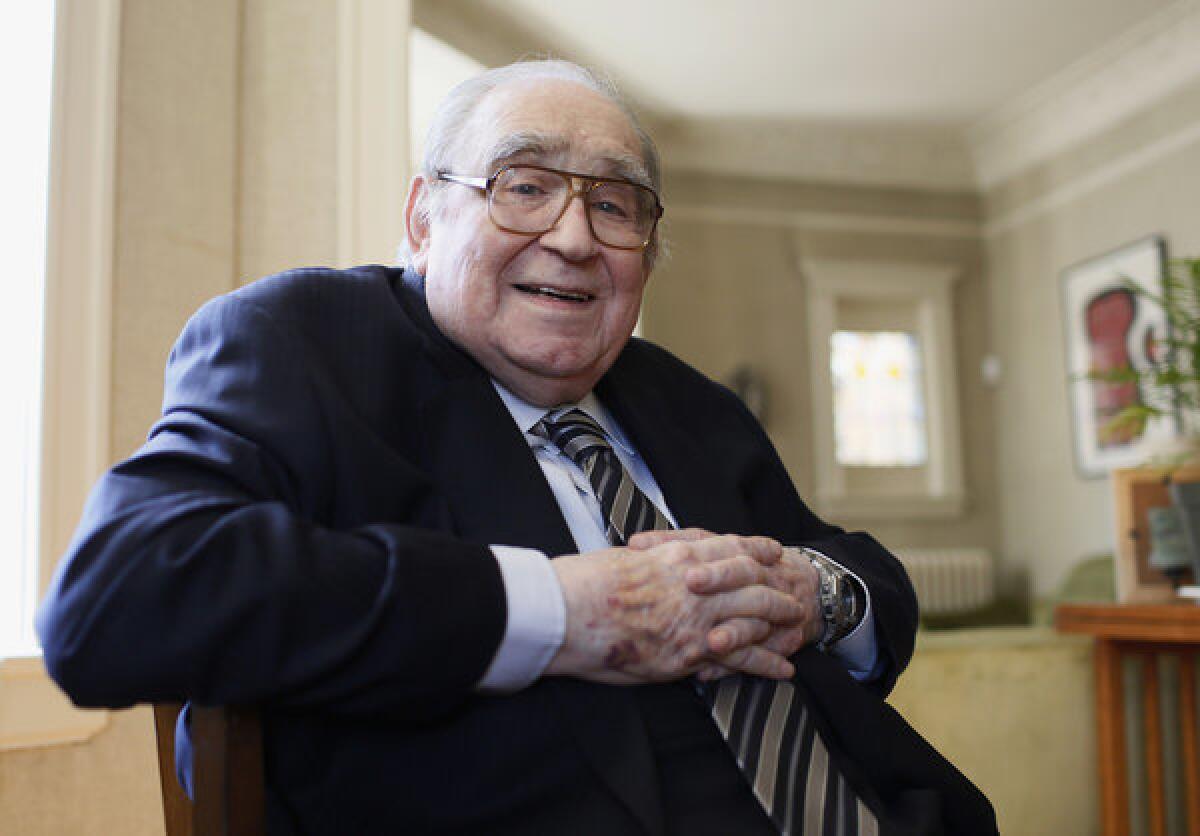Robert Fogel dies at 86; economic historian won Nobel Prize

- Share via
Robert Fogel, the University of Chicago economic historian awarded a Nobel Prize for his data-driven reconsiderations of how railways and slavery influenced U.S. economic history, has died. He was 86.
Fogel died Tuesday at Manor Care Health Services in Oak Lawn, Ill., after a brief illness, according to the university’s Booth School of Business.
The Royal Swedish Academy of Sciences awarded Fogel and Douglass North of Washington University in St. Louis the 1993 Nobel Prize in economics “for having renewed research in economic history by applying economic theory and quantitative methods in order to explain economic and institutional change.” Both men were pioneers in applying modern mathematics to the study of history, a field known as cliometrics, after Clio, the muse of history in Greek mythology.
Fogel first gained notice for his 1964 book, “Railroads and American Economic Growth,” which challenged the widely held assumption that rail travel had fundamentally reshaped the American economy and suggested that a system of canals would have been as effective.
By studying the U.S. economy of 1890 with the rail transport that existed then, and using a hypothetical scenario without railroads, he found that they “were not absolutely necessary in explaining economic development and that their effect on the growth of GNP was less than 3%,” the Nobel organization wrote. “Few books on the subject of economic history have made such an impression as Fogel’s. His use of counterfactual arguments and cost-benefit analysis made him an innovator of economic historical methodology.”
In 1974 Fogel caused a furor with “Time on the Cross: The Economics of American Negro Slavery,” co-written with Stanley Engerman, a professor of economics at the University of Rochester.
Approaching the subject as economists, without making moral judgments, Fogel and Engerman wrote that Southern slavery was an economically rational and efficient system that, by and large, kept slaves well-fed, taught them to farm and collapsed for political rather than economic reasons.
“Our emphasis was not to deny that slavery was an oppressive system,” Fogel said in 1974, “but that it was within the system for the development of black culture.”
In a 1989 book, “Without Consent or Contract: The Rise and Fall of American Slavery,” Fogel presented the moral case against slavery that many other critics saw as conspicuously missing from his work of 15 years earlier.
“My main point, of course, was that markets don’t guarantee that evil systems will collapse, because sometimes they’re very effective, and only political intervention can bring an immoral system to an end,” Fogel told The Times after winning the Nobel. “That was the lesson: Morality is a higher human goal than just efficiency.”
Robert William Fogel was born July 1, 1926, in New York City, four years after his parents and older brother emigrated from Odessa, Russia. He said his education in New York City public schools imbued in him a love for science, literature and history.
He earned his undergraduate degree in 1948 from Cornell University, his master’s degree from Columbia University in 1960 and his doctorate from Johns Hopkins University in 1963.
At Cornell, he switched his focus from science to economics and history, inspired, he said, “by the widespread pessimism about the future of the economy during the second half of the 1940s.”
As Fogel wrote in an autobiography for the Nobel Foundation: “What did we really know about the role of the factory system in economic and institutional change during the 19th century? What was the nature and the magnitude of the contribution of particular new technologies, such as railroads or steel mills, to economic growth?”
The “quantitative evidence” needed to answer such questions, he concluded, required “the most advanced analytical and statistical methods that were then taught in the economics department.”
Besides teaching at the University of Chicago, Fogel held positions at the University of Rochester and Harvard University. As founding director of the University of Chicago’s Center for Population Economics, he oversaw the creation of large sets of data on American life that help economists, medical researchers and other experts forecast health-care costs, the size of the labor force and the demands on pension programs.
Fogel’s wife, Enid, died in 2007. His survivors include two sons, Michael and Steven.
More to Read
Start your day right
Sign up for Essential California for the L.A. Times biggest news, features and recommendations in your inbox six days a week.
You may occasionally receive promotional content from the Los Angeles Times.






